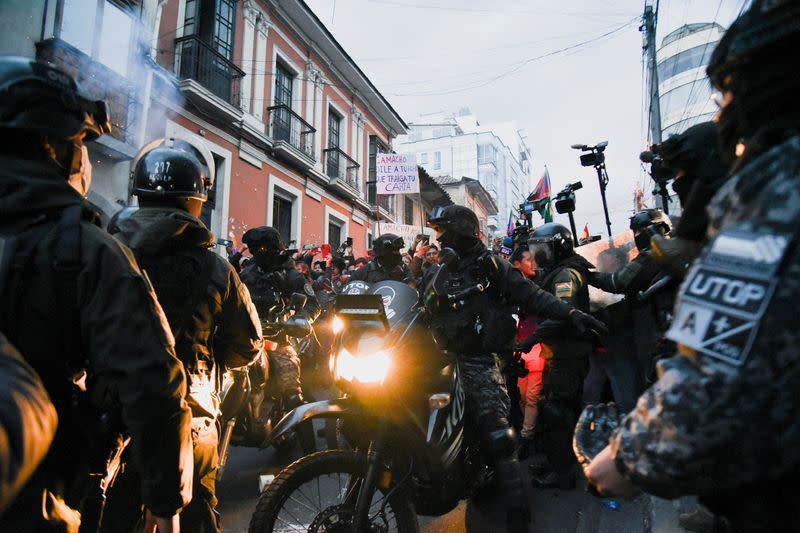Bolivia governor arrest stokes fears of political revenge cycle
- Oops!Something went wrong.Please try again later.
- Oops!Something went wrong.Please try again later.
By Brendan O'Boyle
(Reuters) - The arrest of a prominent Bolivian opposition figure has sparked criticism from human rights groups and thrown a spotlight on how both the country's right and left have used a weak judicial system to go after opponents.
Police arrested Luis Camacho, the right-wing governor of opposition stronghold and farming province Santa Cruz, on Dec. 28 on terrorism charges related to what authorities call a coup in 2019 against then leftist leader Evo Morales. Camacho denies the charges.
Camacho's arrest has sparked a weeklong protest by his supporters, whose ongoing highway blockades could snarl the movement of food and grains.
Camacho, a staunch opponent of Morales' socialist MAS party, joins a long line of leaders in Bolivia on both sides of the political spectrum either jailed or threatened with incarceration.
"We have seen in the past how the crime of terrorism has been used by left- and right-wing governments in Bolivia as an instrument to persecute opponents," said Cesar Munoz, associate Americas director at Washington-based Human Rights Watch.
There was "very fragile" justification for Camacho's pre-trial imprisonment and the use of a "very broad" definition of terrorism, Munoz added.
As a civic leader in 2019, Camacho led protests against Morales, whose party is now back in power under President Luis Arce. Morales had clinched a fourth term in defiance of term limits and a referendum vote against him being allowed to run.
Bolivia's government says Camacho must face justice for what it calls a coup against Morales, who resigned under pressure as the 2019 protests spread, the police mutinied, and union groups and finally the military urged him to step down.
"We're not moved by hate or revenge. What moves us is an unwavering desire for justice in the country," Arce said in 2021. Last week, the attorney general said the case against Camacho had followed due process and was not "political persecution".
International analysts though point to a trend of Bolivian governments using the justice system to target opponents.
The interim right-wing government of Jeanine Anez, who took power after Morales resigned, issued an arrest warrant for the leftist leader over allegations of sedition and terrorism. It also detained officials including his interior minister.
Arce's government, which won election in 2020, then prosecuted Anez herself on terrorism charges related to her assumption of power. She was held in pretrial detention for over a year before being sentenced to 10 years in jail in 2022 in the coup case.
Marco Pumari, a civic leader who ran unsuccessfully on a ticket with Camacho in the 2020 election, is also in pretrial detention on charges of arson during the protests in 2019.
Bolivia's justice ministry did not respond to requests for comment.
'PERSISTENT DYSFUNCTION'
The country's judiciary is widely seen as weak. The World Justice Project's 2022 Rule of Law index ranked Bolivia 130th out of 140 countries overall, 135th in terms of judicial corruption and 139th on criminal justice, only ahead of Venezuela.
"The persistent dysfunction in the judiciary has made it a political weapon," said V. Ximena Velasco-Guachalla, a lecturer at the University of Essex.
In a 2022 report, the UN Human Rights Committee said it was concerned at "cases of political interference and corruption" in Bolivia's judiciary, which it said was weakened by a lack of funding and short-term appointments of judges and prosecutors.
The Inter-American Commission on Human Rights, a day after Camacho's arrest, condemned "the intense use of the judiciary to persecute free expression of thought and the arbitrary deprivation of people's liberty for political reasons in the region." It did not mention Bolivia directly.
Some fear more opposition figures could face a similar fate.
"If the government gets its way, we could in the next year see more opposition leaders behind bars," said Raul Penaranda, a Bolivian journalist and free press advocate.
(Reporting by Brendan O'Boyle; Editing by Adam Jourdan and Lisa Shumaker)





